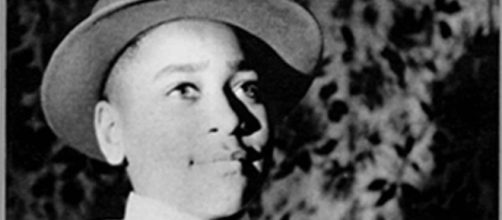It was all a lie. A 14-year-old African-American boy from Chicago named Emmett Till was brutally beaten to death in Klan infested Money, Mississippi in 1955 because of a lie. It was a lie which was all too common in the deep south since slavery. A black male accused of behaving inappropriately towards a white female. In the case of Till, a city boy visiting relatives in the segregated south, images of his disfigured body inflamed tensions and played a role in the civil rights movement.
One summer day, Till and his cousin Simeon Wright had gone to a store owned by Roy and Carolyn Bryant.
For some reason, Carolyn Bryant accused Till of making unwanted verbal and physical advances toward her. Some time later, her husband Roy and his half-brother J. W. Milam kidnapped Emmett Till from his relatives’ home. His bloated, mutilated body was found days later in the muddy Tallahatchie River with an eye dislodged from its socket, a bullet hole in the head and barbed wire around his neck. Emmett Till was totally unrecognizable. At the funeral, his mother, Mamie Till-Mobley insisted the casket remain open for the world to see what had been done to her child. Acquitted by an all-white, all-male jury in September 1955 after an hour’s deliberation, Bryant and Milam seemed at ease at their highly-publicized trial.
Both men, now dead, confessed their guilt in a Look magazine article in 1956.
The truth comes almost sixty years later
Now 82-years-old and having re-married, Carolyn Bryant-Donham’s 2007 Vanity Fair interview is revealed in a new book, “The Blood of Emmett Till.” Bryant told writer Timothy Tyson that her accusations against Till were not true and nothing he did could ever justify what happened to him. Till only stopped by her store to buy 2 cents worth chewing gum. Bryant-Donham, who went into hiding after the trial, added that she felt a tender sorrow for Emmett Till’s mother, who died in 2004.
One of America’s darkest moments
The FBI re-opened the famous case in 2004, in an attempt to haul any accomplices to court.
However, a grand jury decided that there wasn't sufficient evidence to pursue further charges. Bryant-Donham’s manuscript of her recollection regarding Emmett Till, including the trial and murder, is stored in the Southern Historical Collection at the University of North Carolina-Chapel Hill library archives. Per Bryant-Donham’s request, the manuscript won’t be available for public viewing until 2036. It was all a lie, and everyone knew it was.

